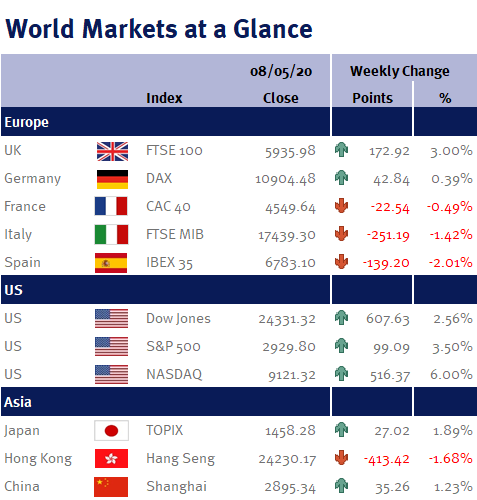The major global equity markets ended the week in positive territory despite more economic data showing the economic damage being brought about by the coronavirus outbreak.
Week ending 8th May 2020.
11th May 2020

After our daily update on Thursday (7 May 2020), we had US initial jobless claims, which climbed by a further 3.17m – taking the total number of claims filed over the last seven weeks to 33.5m.
Then on Friday (8 May 2020), US non-farm payroll data showed job losses of 20.5m, resulting in an unemployment rate of 14.7% – a level not seen since the Great Depression in the 1930s. The unemployment rate was just at a 50 year low of 3.5% in February!
You may rightly be asking why all these job loss numbers are so different.
Unfortunately, they are not comparing apples to apples.
The jobless claims data covered the week to 2 May 2020, while the data for the non-farm payrolls was collected around mid-April – so the payrolls data is a less timely indicator than the weekly initial jobless claims.
Adding to the complexity, the unemployment rate doesn’t capture those who aren’t “unemployed” – as many Americans have gone from having several part-time jobs to just one.
Furthermore, the US Labour Department said the unemployment rate would have been almost 5 percentage points higher if workers had been classified as unemployed due to a temporary layoff, rather than employed but absent from work.
While it seems safe to conclude that anyone who has lost their job is having a pretty stressful time, the data does show, as we have been suggesting (please see here), that the layoffs have been concentrated in sectors such as restaurants, retail and leisure – and as we have previously said, this is not a normal downturn as most of these job losses should be temporary due to the fact that the coronavirus outbreak is a transient issue. As a result, when the economy has fully reopened and we are all consuming again (i.e. we go back out to the shops; eat out in restaurants; and go on holiday), we will undoubtedly see record job gains!
As a result, while this unemployment data is headline grabbing, it doesn’t tell us anything we didn’t already know – i.e. the global economy has hit a brick wall.
It is also safe to say, sadly, that we can expect more of everything in the coming weeks: more job losses, more companies cutting their profit forecasts, more dividend payments being cancelled and unfortunately, more deaths from the coronavirus outbreak.
Given this you may also be wondering why equity markets have started to recover from their lows at the end of March. That is because the equity market is not the economy – and what this data isn’t telling you is that the global economy is starting, albeit slowly, to reopen. Hence why we have argued that it is best to focus on the likely duration of the economic decline rather than the depth.
Sentiment was also helped by news that US and Chinese trade negotiators are speaking about plans to implement a trade deal, despite Donald Trump’s comments about punishing China with tariffs for misleading the world about the scale and risk of the coronavirus.
Looking ahead to this coming week, we have US weekly jobless claims on Thursday (14 May 2020); UK, US and Chinese retail sales; UK & US industrial and manufacturing data; US and Chinese CPI inflation; UK and Eurozone Q1 GDP; and Chinese industrial production.
Investment Management Team
Monday 11th May 2020
As you have all undoubtedly heard, Boris Johnson yesterday (Sunday 10 May 2020) announced that although there will be no immediate end to the UK’s lockdown, restrictions on movement were loosened.
These “first careful steps” to reopen the economy clearly highlight the opposing pressures of trying to save lives from a potential second peak, while at the same time trying to boost confidence and reopen the economy in order to save companies from collapsing.
Consequently, we will be watching the response of consumers to these changes rather than focusing on backwards-looking economic data releases. Interestingly, demand for tickets to today’s reopening of Disney’s Shanghai theme park offers hope that consumers will lead the rebound after being cooped up, as tickets sold out within minutes of going on sale – if the same is repeated globally, then the massive job losses we have been seeing will only be temporary and we will see a sharp economic rebound (i.e. a V-shaped economic recovery).
Over the weekend there was also positive news from the US: Andrew Cuomo, the Governor of New York, said that the state is “finally ahead of the virus” and that some parts of the state may reopen this week, while Apple said that it will start reopening its US shops this week.
Investment Management Team
Links to websites external to those of Wealth at Work Limited (also referred to here as 'we', 'us', 'our' 'ours') will usually contain some content that is not written by us and over which we have no authority and which we do not endorse. Any hyperlinks or references to third party websites are provided for your convenience only. Therefore please be aware that we do not accept responsibility for the content of any third party site(s) except content that is specifically attributed to us or our employees and where we are the authors of such content. Further, we accept no responsibility for any malicious codes (or their consequences) of external sites. Nor do we endorse any organisation or publication to which we link and make no representations about them.

